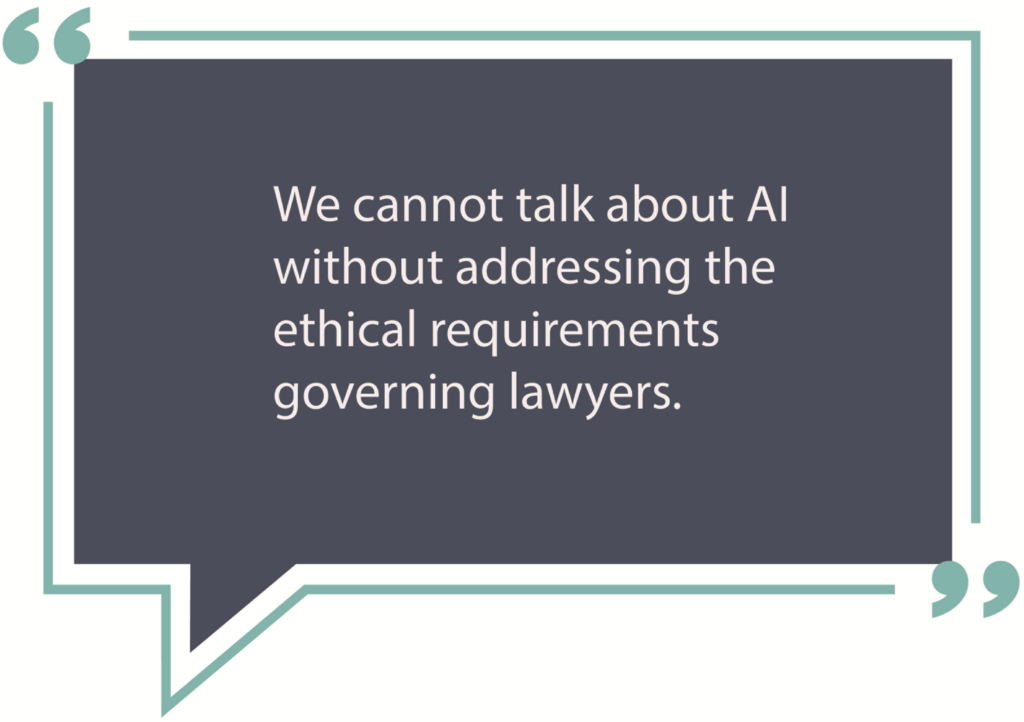
Published in Headnotes, Dallas Bar Association, by Alexandra Wahl, November 2024
Artificial Intelligence (AI) is creeping into every nook of the legal world, and litigation is no exception. Whether you are drowning in research or fine-tuning a closing argument, AI tools are ready to lend a hand – or perhaps more accurately, a brain. But before we get too comfy with our digital assistants, we should look at how AI is changing legal strategies, what it can (and cannot) do, and the ethical tripwires to avoid.
Legal Research with Westlaw’s CoCounsel
Forget the days of scrolling endlessly through case law databases. Westlaw’s CoCounsel is the AI sidekick you did not know you needed. Do you have a burning legal question? Fire off a 1 to 2 sentence inquiry into CoCounsel that includes the relevant practice area, cause of action, governing law, the remedy you are after, desired outcome, and any material facts – and then sit back and watch the answer roll in. Associates today are living the dream. But even beyond answering these legal queries with state-specific references, its real magic lies in QuickCheck.
Drop your opponent’s brief – or your own – into QuickCheck, and it will analyze the research determine whether the authorities are still good law, review quotations for accuracy, suggest relevant cases you may have missed, point to secondary sources, and even poke holes in your arguments. And if you want a peek into how your judge has ruled on similar motions in the past, CoCounsel has your back. It is almost like having a cheat sheet for court.
Similarly, Bloomberg Law’s Brief Analyzer plays referee by scanning briefs and flagging any missing cases or content. These tools mean you can stop worrying about missing key arguments and focus on winning.
Grammarly: Advanced Grammar and Style
If you are still relying on Microsoft Word’s Clippy to catch typos, it is time for an upgrade. Grammarly does not just fix grammar anymore; its plugin is constantly at the bottom of your screen catching everything you type – emails, pleadings, motions – for tone, clarity, and even ambiguity. Grammarly can check for consistency to maintain uniformity in capitalization and legal terminology throughout your 50-page brief or catch anything that may be considered plagiarism in a publication. It is like your second set of eyes, so you will never want to hit “send” without running a quick check first.
ChatGPT: Your Friendly (But Fickle) AI Assistant
Now for the wildcard – ChatGPT. This AI tool has become notorious for confidently delivering wrong answers (remember that infamous case where lawyers used ChatGPT to write a brief, only to discover it had invented case law? Oops).
But you should not write off ChatGPT just yet. It can be handy for things like rewriting emails, brainstorming deposition questions, or generating fresh angles for your closing arguments. Think of ChatGPT like a clever first-year – you still need to double-check its work before presenting to the boss.
Try these prompts for ChatGPT:
- “Rewrite this email to sound professional but not too formal.”
- “Prepare deposition questions based on this fact pattern: [insert the factual background section from your petition].”
- “Summarize the key points of this contract.”
- “Draft an outline for a closing argument in a breach of contract case.”
Just remember: always double-check its output. ChatGPT and other large language models (LLMs) tend to “Hallucinate,” meaning they occasionally make things up. A 2024 study from Stanford found that LLMs like ChatGPT hallucinate 75 percent of the time when answering questions about court rulings. Yikes.
Ethical Considerations: AI and Legal Practice
We cannot talk about AI without addressing the ethical requirements governing lawyers. Sure, AI tools like ChatGPT and CoCounsel are great for boosting productivity, but there is a fine line between using them wisely and overreliance. Lawyers are ethically bound to provide competent representation, which means you cannot just hand your tasks to an AI and call it a day.
AI tools can speed up research and drafting, but they are not flawless. A misplaced citation or wrong case reference could not only weaken your argument but also harm your client’s case. So, while AI can assist, the final responsibility still rests with you to ensure the accuracy and quality of your work.
AI: A Boost, Not a Replacement
Despite all the buzz, AI is not here to replace lawyers – it is here to make us faster, smarter, and a little less stressed. Whether it is drafting a motion, checking your opponent’s brief, or just keeping your grammar in check, AI can slash time-consuming tasks and give you a head start. But remember, AI can make mistakes, so you are still in charge of making sure your final product is solid.
So, should you hop on the AI bandwagon? Absolutely – just do not forget to steer.
View PDF




